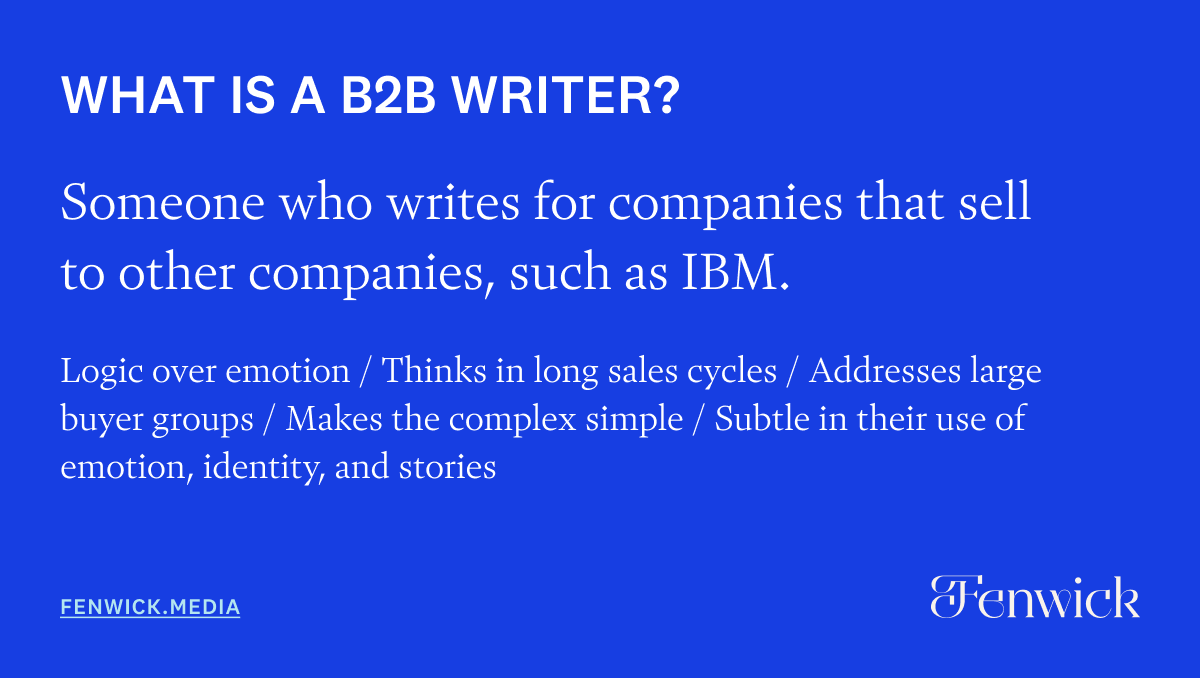A business to business (B2B) writer has a very particular job: To simplify abstract topics into stories most people can follow.
That takes a lot of thought work. For example, to know why a company would maintain a "honeypot" of thousands of email inboxes that they hope get hacked, you have to know about how cybersecurity works. And why a cybersecurity company would want that. (To detect hackers and patch their own code.)
Consumer writers explain things too, and this isn't to say B2B is more difficult—only different. It's more logical, more procedural. More focused on the physical sciences, workflows, and code. This is why those who thrill in B2B tend to be systems thinkers. Because there are those who think trucking is "boring" and those who know that to understand B2B is to understand the infrastructure behind their entire world.
Ever wonder how shirts get from Vietnam to Boise? How politicians get your phone number to spam text you? How is Ukraine making all those drones? Why Facebook becoming evil was inevitable? And why Harry Potter, a Warner Brothers franchise, suddenly available on Netflix?
To every question, there is a B2B answer.
In this article, I share what makes B2B writers good at their job, what the job requires, how to find roles, and what to be reading to improve your systems thinking.
Get my newsletter on staying inspired in your B2B role →
B2B writers love to make sense of making sense
Let's explore the differences between business and consumer more closely. Take the example of the electronics giant Phillips, which sells to both people and businesses.
If you write for a consumer division of Phillips, you can probably explain why someone would want to buy a color-adjustable lightbulb in a sentence or two. Whereas if you write for their medical division which sells to hospitals, you have to know why doctors need maternal fetal monitors. And why "automated coincidence deflection" would make their ears perk up.
This is why B2B writers tend to be short on floral descriptions and long on systems thinking.
If we had to pick one phrase to separate the two, it’s that B2B writers tend to be systems thinkers. Consumer writers might get by on wit alone but in B2B, that’s just one piece. You have to be a quick study of how businesses operate and make money because you’re writing for buying groups in a work capacity. If you’re to persuade that group, you must understand the complex ways in which those individuals make decisions.
That often means writing one article that’ll have to appeal to three or perhaps even seven individuals. A company’s chief financial officer may not want to spend money, whereas her head of marketing does. You, a B2B writer, will have to create the guide that explains to both of them why they should talk—and why your automation app is good for both.
You might be direct about it—say by writing an an article strictly on the merits of your automation app—or indirect, a process generally known as content marketing where you interview experts, cite studies, and form a compelling argument for why executives ought to be automating more things.
Meet a few B2B writers skilled in this work.

Former Writer at Fenwick
Tamilore is a content writer and strategist for B2B companies. She abhors soulless business writing, and ensures every piece she crafts is infused with personality and empathy. When not typing away or shuffling through a million open tabs, you’ll find her curled up reading a fiction novel, or watching feel-good movies. Learn more about her work.

Former Editor at Fenwick
Donnique is a dreamer and a doer. From writing vulnerable poetry and spinning marketing plates to advocating for affordable housing, Donnique hopes to cultivate a just, more hopeful world. It's only natural she's inspired to distill beauty from B2B, pulling engrossing stories out of unlikely places. When she isn’t slicing magazines into collages, she's growing an indoor jungle, complete with one tropical tree.

Former Managing Editor at Fenwick
With a background writing for B2B tech companies like Vidyard and a master’s degree in English from Oxford, Carina fuses a marketer’s ingenuity with a deep love of language and storytelling.
The line between B2B and B2C is soft. Many companies are both. Amazon, for example, sells soap, but also servers. GE sells lightbulbs, but also jet engines. The distinction depends on context and many writers can write for both. You also might say that B2B copywriters rely on logic much more than their consumer counterparts, who focus more on emotion and identity. Take, for example, a consumer looking to purchase a cashmere sweater. She’s thinking about how it affects her personally. Does it fit? is it affordable? Will her friends agree it’s nice?
She can, with the right words, be compelled to buy on impulse.

In contrast, a B2B writer writing about servers must convince a chief technology officer that what they’re selling is sound, and that sale might take a year. They must convince said officer why investing in new solid state drives is rational. That their servers in particular are technologically advanced, consummately engineered, destined to last, and inexpensive to maintain.
This needn’t take more words, but it must be exact, credible, and founded in reason.

Where things get really interesting though is if you can master B2B writing to such a degree that you can weave in consumer-like writing—to inject a sense of ease and play. To persuade with emotion and identity. To explain to that chief technology officer that the servers are fine, but a much better prize is that they’ll join an elite cadre of technologists smart enough to purchase servers like those, and get to meet those peers at your summit.
For examples of that sort of writing, you’ll want to be on our newsletter.
Differences between (most) B2C and B2B audiences
People call business to business sales a “considered purchase” because they involve lots of people who take their time. A common example is an enterprise software subscription that costs $60,000. The marketing team wants to purchase it, but they’ll need approval from the sales team, IT team, finance team, and compliance team. For expedience, they form a committee. Those seven people then spend nine months going through rounds of meetings with various vendors to draw up a shortlist and decide.
Throughout that cycle, they’ll read a lot, and ask a lot of questions. It’s a B2B writer’s job to help craft those briefs, decks, scripts, and proposals.
That’s in great contrast to consumer sales where purchases can be quick. They aren’t always, of course, and the lines can blur. A B2B sale can look like a consumer one, as when a project manager purchases the software Notion for $8 per month on a credit card. And a consumer sale can look like a B2B one, as when a luxury car dealership courts a high net worth family for years, sending gifts and offering test rides. But the distinctions exist because on the whole, they are useful.
B2B is considered, lengthy, and primarily rational. B2C is unplanned, quick, and primarily emotional.
Whereas business to business writers
- Primarily persuade with logic
- Underuse (or misuse) storytelling
- Address long sales cycles (months or years)
- Address large buying groups
- Must explain complex products simply
- Are concerned with audience demographics, firmographics, technographics, intent data
Business to consumer writers
- Primarily persuade with emotion
- Rely heavily on storytelling
- Address short sales cycles (days or weeks)
- Address small buying groups (individuals)
- Must explain simple products brilliantly
- Are concerned with audience demographics, psychographics

What B2B and B2C writers can learn from each other
B2B writers can often teach consumer writers a process for guiding people to buy over a very long time. They tend to excel at thinking in systems, for one must stay organized over a yearslong sales cycle. They can teach consumer writers to think in terms of a marketing funnels and content marketing.
In turn, consumer writers can teach business writers to appeal to readers’ emotions. Business writers have a habit of becoming “captured” by the products they sell, and can get to thinking their technology is interesting because they understand it—and forget that buyers are people. They fall into using jargon, buzzwords, and cliché. A consumer writer can help a business writer untangle all that, and appeal to people’s identities to convince them to convert.
But aren’t B2B writers still just writing for people?
No matter the vertical, B2B writers are still just writing for an audience of people. This idea has prompted a wave of pundits to advocate replacing the B2B-B2C paradigm with B2H, or business to human. (Because, acronyms.) But the B2H philosophy is of limited utility and is most useful simply as a reminder to B2B writers that they have a lot to learn from their B2C counterparts.
There’s no question B2B writers are more successful at earning attention when they mimic consumer outlets by telling stories about people, which B2B companies often forget to do. But most B2B prospects will still face technical hurdles unlike anything consumers run into. They must, for example, seek approval from a boss, and if their case is only based on their own personal interest (“this’ll make me look good”) they’re unlikely to win budget. B2B writing is different because those writers have to understand the mechanics of how those purchases are actually made—both emotional and logical. The B2B-B2C paradigm is useful because it accounts for that difference.
For a look into that world, take a look at the tool Help A B2B Writer. Take a look at the technical nature of the requests, and you can start to work back to the sorts of challenges B2B writers face.
What is B2B Freelance Writing?
B2B freelance writing is when writers work on contract for B2B brands. In the vast majority of cases, they work remotely. The marketing team will share a content brief and the writer will handle the research, writing, and often, editing. Freelance relationships afford businesses more flexibility and freelancers the opportunity to manage, learn from, and grow with multiple clients.
B2B freelance writers often have clearly-defined B2B writing niches and run in small social circles. B2B marketing software experts, for instance, are unlikely to hop into writing about healthcare. And writers who have carved out a niche as “the” video technology writer are unlikely to shift into an area where they’re less experienced. This makes for a tight-knit, collegial environment where B2B freelancers cooperate with freelance writing peers to pass along work.
Common B2B writing niches:
- Healthcare
- Finance
- Technology
- Manufacturing
- Transportation
- Banking
- Energy
- Law
Common B2B writer specialties:
- B2B technical writer
- B2B copywriter
- Content marketing writer
- Social media writer
How do I find a good copywriter?
If you’re hiring a B2B writer, your best option is to seek referrals through your network. Domain expertise is essential to writing believably about B2B topics, and it’s difficult to find someone who’s both an excellent writer and knowledgeable about the industry. If you do find one, never let them go.
If your options are limited and you can’t have both experience and writing skill, select for writing skill over industry expertise. You can teach someone how software works, but teaching them to produce clear copy is much trickier. It could take a lifetime.
Good ways to find B2B copywriters:
- Ask for referrals
- Post on job boards
- Read industry blogs and look for freelance contributors
- Find a niche agency or content studio
- Get good at writing yourself, so you can recognize good work
Bad ways to find B2B copywriters:
- Content mills (Scripted, Skyword, ClearVoice)
- General freelancing platforms (UpWork, Fiverr, Freelancer)
Be careful outsourcing your writing needs to an agency. The bigger the agency, the more likely they are to think all writing is interchangeable and to farm your work out to non-writers. It’s not uncommon for agencies to ask their website designers to also generate the website’s copy. If you must use an agency, find one that’s small and considers writing its specialty, like Fenwick.
Avoid content mills at all cost. These are services like Scripted, Skyword, and ClearVoice, which value speed and volume over quality and clarity. They’re essentially performing writing arbitrage: They charge high rates to cover the cost of the business and shop out tasks at below-living wage levels to inexperienced freelancers.
Also avoid generalist freelancing platforms such as UpWork. It’s simply not where good B2B writers look for work. Because of their niche, the best B2B writers already know who their ideal clients are and unlikely to waste their time on these platforms.




